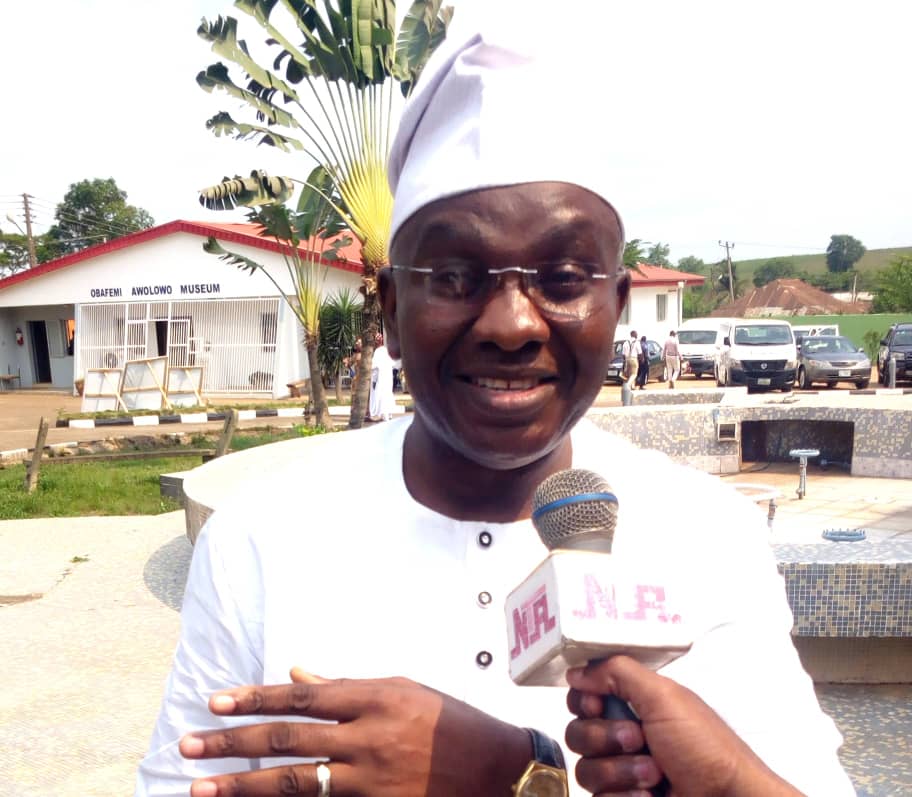Business
Paseda Blames Youths Negligence In Government On Nigeria’s Economic Woes

Non-involvement of youths in the present administration of the country has been attributed to the telltale result of the current economic woes.
The Ogun State Governorship candidate of Unity Party of Nigeria (UPN) in the last general elections, Otunba Rotimi Paseda, stated this on Saturday while delivery a speech on the topic “Raising Our Future Generation” at the annual youths seminar organized by the Ultimate Achievers Initiative held at Mowe/Ibafo in Obafemi Owode local government area of the state.
Otunba Paseda stressed that the inability of both the federal and state governments to maximize the full potentials of the youths is responsible for the economic ailment, which has crippled the country’s agricultural and manufacturing sectors.
He pointed out that the tale woes of the economy made the home-made goods globally uncompetitive while jerking up the value of local currency.
He said the neglect of the youths in decision making of government policies has done more harm than good to the agricultural sector of the economy, emphasizing the need to divert the energy of the youths into agriculture, which was the nation’s goldmine before oil discovery.
Otunba Paseda, who was represented by his Political Coordinator, Engineer Babatunde Folarin, opined that there is urgent need for the government to properly fund and monitor Agriculture-oriented institutions, agencies, farmers and relevant stakeholders, as well as provid them with high-quality seeds, fertilizer, feed and modern technologies.
According to him, about 2.02 billion people are suffering from chronic hunger worldwide, while 575 million of these people are from Sub-Saharan Africa, of which Nigeria forms a larger part.
“Food crisis and the attendant poverty are the tell-tale result of our neglect. And this will be so, because our farmers are old and the energetic youths were left out.
“Our dear nation is presently trapped in a suffocating web, having relegated Agriculture, which is her initial goldmine to oblivion at the expense of oil wealth. Now that the oil-wealth has turned to oil woes, the country is embroiled in food crisis and her citizens are ravaged by abject poverty.
“Instead of beholding the legendary ground nut pyramid in the North, the sprawling barns of cocoa in the Southwest, the mountainous heaps of coal in the Southeast which were the hallmarks of our past efficiency and industry, we are today daily witnessing the evidence of misplaced priorities and inefficient utilization of God given endowment.
“Narrowing down to Nigeria, the latest United Nations Development Programme (UNDP)’s Human Development Report informs that not less than 25.5million of the estimated 170million of Nigerians go to bed with empty stomach daily. When you compare the aforementioned staggering figure of poverty-stricken Nigerians with the report of FAO on soil productivity in Nigeria, you see no justification for poverty in the land.
” A nation that does not equip the youths will remain stagnant and retrogress. China today, has become world Trade Centre and technologically driven as a result of her vision to adequately utilize the potentials of the nation’s economy. What is wrong with Nigerian government and the youths?
“The earlier our government realized the urgent need for proper funding and monitoring of Agriculture oriented institutions, agencies, farmers and relevant stakeholders, as well as provision of high-quality seeds, fertilizer, feed and modern technologies, the better for our Agriculture sector”, Paseda averred.
He however promised to support youth initiatives that would help them actualize their real potentials with a view to making them self-reliant and contribute their quota towards taking Ogun State and Nigeria to an enviable height.
“The zeal to effectively engage and encourage the youths to actualize their real potentials triggered our resolved at Paseda Legacy Foundation to take youths course as part of our core priorities and make them independent without becoming political tools.”
Business
Nigeria’s Inflation Drops to 15.10% as NBS Reports Deflationary Trend

Nigeria’s headline inflation rate declined to 15.10 per cent in January 2026, marking a significant drop from 27.61 per cent recorded in January 2025, according to the latest Consumer Price Index (CPI) report released by the National Bureau of Statistics.
The report also showed that month-on-month inflation recorded a deflationary trend of –2.88 per cent, representing a 3.42 percentage-point decrease compared to December 2025. Analysts say the development signals easing price pressures across key sectors of the economy.
Food inflation stood at 8.89 per cent year-on-year, down from 29.63 per cent in January 2025. On a month-on-month basis, food prices declined by 6.02 per cent, reflecting lower costs in several staple commodities.
The data suggests a sustained downward trajectory in inflation over the past 12 months, pointing to improving macroeconomic stability.
The administration of President Bola Ahmed Tinubu has consistently attributed recent economic adjustments to ongoing fiscal and monetary reforms aimed at stabilising prices, boosting agricultural output, and strengthening domestic supply chains.
Economic analysts note that while the latest figures indicate progress, sustaining the downward trend will depend on continued policy discipline, exchange rate stability, and improvements in food production and distribution.
The January report provides one of the clearest indications yet that inflationary pressures, which surged in early 2025, may be moderating.
Bank
Alpha Morgan to Host 19th Economic Review Webinar

Alpha Morgan to Host 19th Economic Review Webinar
In an economy shaped by constant shifts, the edge often belongs to those with the right information.
On Wednesday, February 25, 2026, Alpha Morgan Bank will host the 19th edition of its Economic Review Webinar, a high-level thought leadership session designed to equip businesses, investors, and individuals with timely financial and economic insight.
The session, which will hold live on Zoom at 10:00am WAT and will feature economist Bismarck Rewane, who will examine the key signals influencing Nigeria’s economic direction in 2026, including policy trends, market movements, and global developments shaping the local landscape.
With a consistent track record of delivering clarity in uncertain times, the Alpha Morgan Economic Review continues to provide practical context for decision-making in a dynamic environment.
Registration for the 19th Alpha Morgan Economic Review is free and can be completed via https://bit.ly/registeramerseries19
It is a bi-monthly platform that is open to the public and is held virtually.
Visit www.alphamorganbank to know more.
Business
GTBank Launches Quick Airtime Loan at 2.95%

GTBank Launches Quick Airtime Loan at 2.95%
Guaranty Trust Bank Ltd (GTBank), the flagship banking franchise of GTCO Plc, Africa’s leading financial services group, today announced the launch of Quick Airtime Loan, an innovative digital solution that gives customers instant access to airtime when they run out of call credit and have limited funds in their bank accounts, ensuring customers can stay connected when it matters most.
In today’s always-on world, running out of airtime is more than a minor inconvenience. It can mean missed opportunities, disrupted plans, and lost connections, often at the very moment when funds are tight, and options are limited. Quick Airtime Loan was created to solve this problem, offering customers instant access to airtime on credit, directly from their bank. With Quick Airtime Loan, eligible GTBank customers can access from ₦100 and up to ₦10,000 by dialing *737*90#. Available across all major mobile networks in Nigeria, the service will soon expand to include data loans, further strengthening its proposition as a reliable on-demand platform.
For years, the airtime credit market has been dominated by Telcos, where charges for this service are at 15%. GTBank is now changing the narrative by offering a customer-centric, bank-led digital alternative priced at 2.95%. Built on transparency, convenience and affordability, Quick Airtime Loan has the potential to broaden access to airtime, deliver meaningful cost savings for millions of Nigerians, and redefine how financial services show up in everyday life, not just in banking moments.
Commenting on the product launch, Miriam Olusanya, Managing Director of Guaranty Trust Bank Ltd, said: “Quick Airtime Loan reflects GTBank’s continued focus on delivering digital solutions that are relevant, accessible, and built around real customer needs. The solution underscores the power of a connected financial ecosystem, combining GTBank’s digital reach and lending expertise with the capabilities of HabariPay to deliver a smooth, end-to-end experience. By leveraging unique strengths across the Group, we are able to accelerate innovation, strengthen execution, and deliver a more integrated customer experience across all our service channels.”
Importantly, Quick Airtime Loan highlights GTCO’s evolution as a fully diversified financial services group. Leveraging HabariPay’s Squad, the solution reinforces the Group’s ecosystem proposition by bringing together banking, payment technology, and digital channels to deliver intuitive, one-stop experiences for customers.
With this new product launch, Guaranty Trust Bank is extending its legacy of pioneering digital-first solutions that have redefined customer access to financial services across the industry, building on the proven strength of its widely adopted QuickCredit offering and the convenience of the Bank’s iconic *737# USSD Banking platform.
About Guaranty Trust Bank
Guaranty Trust Bank (GTBank) is the flagship banking franchise of GTCO Plc, a leading financial services group with a strong presence across Africa and the United Kingdom. The Bank is widely recognized for its leadership in digital banking, customer experience, and innovative financial solutions that deliver value to individuals, businesses, and communities.
About HabariPay
HabariPay is the payments fintech subsidiary of GTCO Plc, focused on enabling fast, secure, and accessible digital payments for individuals and businesses. By integrating payments and digital technology, HabariPay supports innovative services that make everyday financial interactions simpler and more seamless.
Enquiries:
GTCO
Group Corporate Communication
[email protected]
+234-1-2715227
www.gtcoplc.com
-

 celebrity radar - gossips6 months ago
celebrity radar - gossips6 months agoWhy Babangida’s Hilltop Home Became Nigeria’s Political “Mecca”
-

 society6 months ago
society6 months agoPower is a Loan, Not a Possession: The Sacred Duty of Planting People
-

 society5 months ago
society5 months agoReligion: Africa’s Oldest Weapon of Enslavement and the Forgotten Truth
-

 news6 months ago
news6 months agoTHE APPOINTMENT OF WASIU AYINDE BY THE FEDERAL GOVERNMENT AS AN AMBASSADOR SOUNDS EMBARRASSING








You must be logged in to post a comment Login